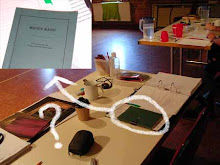
There's been some activity over the weekend, but not a lot of activity; a really good sign. Chris and Lally have decided to make a few cuts here and there, but the broad feeling is that the work that needs doing is predominantly on the scenes, not on the script.
It's an interesting balance for new scripts. Established scripts and 'classic' scripts have their own validation. There is an implied onus on the company to make the script work. When it is accepted that the writer has written a great script, it is expected that the script will make great theatre if the artists can make it 'live.' With new scripts there's a different balance. Text can be cut or changed basically at will. There is nothing sacred about the new script yet. The script can be 'developed' in whatever way required to serve the play, to make the play work on stage.
The challenge can be in knowing when to stand by the script, trusting that with hard work the actors will make the text work, and when to find fault with the script, and therefore cut or change it.
This is especially the case after early runs of a new play. There's no question that early runs will be rough. It is one of the great skills of a directors and dramaturgs of new plays to be able to decipher in these early runs when the 'roughness' is in the script and when it is in the performance readiness. Sometimes it can be really hard to tell.
I asked resident Malthouse Dramaturge in Residence Maryanne Lynch how she deciphered from early runs whether issues she saw were problems with the script, or problems stemming from lack of performance readiness. This is some of what she said;
Chris and the writing team have been making these calls over the weekend. For the most part they're trusting the script; after all, it has been literally years of development to this point.
So, for the company it's back to scene work again. Chris has developed a list of scenes to work on, and the cast make their way through these. Morale is really high today, as all the cast are getting closer and more comfortable with their characters. They are 'inhabiting' their characters more than before, rather than being mid-process of developing who they are. They seem freer today to work on the details of the scenes; thinking less, trusting that their offers are 'in character.'
Chris is directing like the conductor of an orchestra today. He moves into the space, eyes wide and arms outstretched, conducting the movement of the actors in the space. He winds them up, he slows them down, he controls their flow. There is great clarity in the rehearsal room now. They are consciously working on fewer simultaneous issues now because there is a 'living' base, which everybody shares and can evolve with each new direction or scenic idea. Previously, every change or new direction set off a chain of questions about how the direction would effect every other related issue. Now it is like the 'living' base accomodates and shifts for every new direction. It slots in, and the rest of the work shifts and slots into a new place quite naturally. They don't need to discuss it.
Accordingly, they are actually now able to work on more simultaneous issues. Chris is directing the secondary stage action at the same time as the primary dialogue. Before today the secondary, or incidental stage action has been only rudimentarily dealt with. For example Chris will say, “You guys will do so-and-so in the background, but we'll get to that later.” Well, “later” is now. There is headspace for both Chris and the cast to spend time on this level of action. It is incredibly important work. Now that it's there, it's already adding in a lot of detail in respect of the relationships. Some of the character issues and 'relationship' issues that they've been discussing in relation to the scripted scenes is being layered into the secondary action.
It draws my attention back to the limitations of script analysis. By its nature a script analysis will focus heavily on the dialogue, and can encourage consternation about whether certain elements of the play are being properly explored or enacted by the script. Sometimes though, vital elements of a relationship can actually be crystalised with a single, or a sequence of very short dialogue-less encounters in the incidental action. Action that occurs incidentally during another dialogue or song. It is very difficult to analyse the effect of these moments in a script analysis situation.
Tomorrow's list of scenes has already been drawn up, and there is another run tomorrow afternoon. The pattern seems well set; runs separated by focussed work on individual scenes that require detailing.




No comments:
Post a Comment